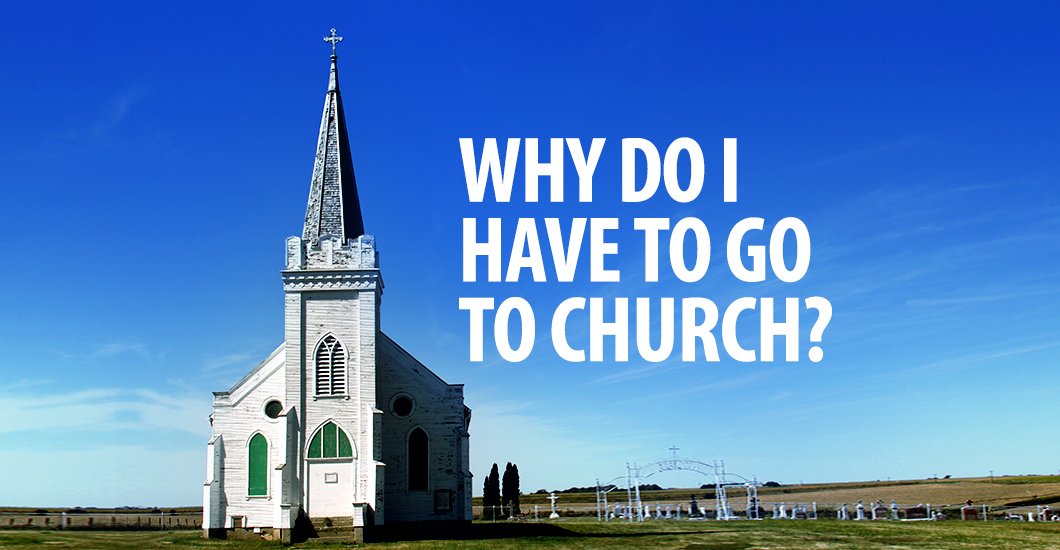Trending Articles
Why Do I Have To Go To Church?
Have you ever seen a tightrope walker? The most important part of getting started is not balancing. Balance is important only after you start. In the beginning, the most important thing is to make sure the rope does not go slack. To cross the distance, the rope has to be held at both ends. There has got to be tension.
That is a good image when we talk about a lot of questions, including this one: Why do I have to go to church? There are two things that we have to hold in tension, and by doing so, we can make it safely across to the other side.
Regarding the question, here is the tension: we are sacred and social. We are sacred individuals, created in God’s image. We are also social individuals, and this is also because we are created in God’s image.
On one side of the rope, we assert that we are each awesome and unique. We are loved personally by a personal God who is fully invested in us as if we are the only one He has ever created! This is why G.K. Chesterton pointed out that going to Church does not make one a Christian any more than sitting in a garage makes one a car. Because God is relational, my worship of God must come from my heart. I must make a personal profession of faith in Him.
Here is the other side of the rope: we are also created by a God who dwells in “community.” The mystery of the Holy Trinity reveals that God is one in nature, but three in persons. God is not alone, and so He creates individuals who are interdependent.
The family is the first community we experience and the only way we enter into the world, understand ourselves, and gain insight into our destiny. Heaven is the communion of a perfected human family united to God’s Trinitarian life. If we ignore this social dimension, we misunderstand the point of our personal relationship with God—it is so that we can learn to love and be loved by others the way God desires.
So, when answering the question “why should I go to church?”, we need to remember to hold both sides of the rope in tension. On one side, we need to understand that we are created as sacred individuals and on the other, that we are created as social individuals. Our response to the reality of God, our worship of Him, must therefore be both personal and public.
If we can hold both sides of the rope in tension, we can start to walk across. A quick look into the Old Testament and the New shows us just how to do that.
In the Old Testament, the Ten Commandments affirm that God cares about what we do on the day of rest, the Sabbath. He does not suggest it, but demands that we honor it. He is not doing that for His sake any more than a doctor is when he demands that you take a few days off from school or work to get better. It is not for your doctor, it is for you. To stay spiritually alive and healthy, God demands that we honor the Sabbath weekly.
Resting is directed at remembering what the right order of relationships are: God, others, self.
Stepping away from daily business, we are free to do what God desires—to enter into rest and grow in intimacy with God and others. So one part of this balancing act is knowing that in the Old Testament God really does care about our time.
In the New Testament, we see why God cares about the time we set aside for the Sabbath. The New Testament reveals what the Old Testament was preparing us for. The Passover meal in the Old Testament commemorated the deliverance of Israel from Egyptian slavery to the Promised Land. Jesus elevates this ritual in His Last Supper and now it communicates what it once only commemorated: new life, a life of freedom, the fullness of life itself. God’s life given to us in a sacramental action. Jesus becomes the very food for our own journey towards Heaven.
Eucharist is a sacrament where we gather together, as the “new Israel” to offer thanksgiving to God (that is what Eucharist means), and participate in the very sacrifice of Jesus that sets us free from sin, separation, and death. At the Mass, it is Jesus giving Himself to us and our response of thanksgiving is what we give back to Him.
So it would not make much sense to desire intimacy with God but ignore the very way that God wants to weekly (and daily!) invite us to share in His life.
Two ends of the rope: personal intimacy and public participation in community. Sacred and social.
So you see, when the Church reminds us that we have an obligation to go to Mass on Sunday’s, it is not ignoring our need for intimacy. Mass attendance assumes that we are honoring the Sabbath already by resting from unnecessary work and growing our relationships. If we only honor the Sabbath by just going to church, we miss the meaning of rest and relationships with others that God desires from us. But if all we do is rest and grow relationships, and not go to church, we miss the very place where we get to intimately receive and respond to the new life Jesus is offering us.
We need both ends of the rope to be held taught because whichever side gets loosened, the result is the same: You do not make it across to the other side. So instead of loosening one side of the rope or the other, let us keep the tension and get started on the journey together by asking Jesus to help us with our balance as we honor the Sabbath, and grow in intimacy with Him and others!
Joe Philip (Twitter @joephlip101) is the new Director of The School of Evangelization for St. Paul Evangelization Institute. He is a former Campus Minister, theology teacher, and retreat coordinator for Powers Catholic High School in Flint, Michigan. Philip earned his M.A. from Franciscan University of Steubenville, Ohio. He and his wife, Tara, travel and share their love for Jesus and the Church by leading and speaking at retreats. They are happy parents to three children. Philip served as host of SHALOM WORLD television’s original series, “SEEKERS.” Philip serves as Contributing Editor of “Shalom Tidings” magazine. In 2018, he will be one of the featured speakers for the inaugural Shalom Media Summit to be held in Illinois.
Latest Articles
Want to be in the loop?
Get the latest updates from Tidings!








